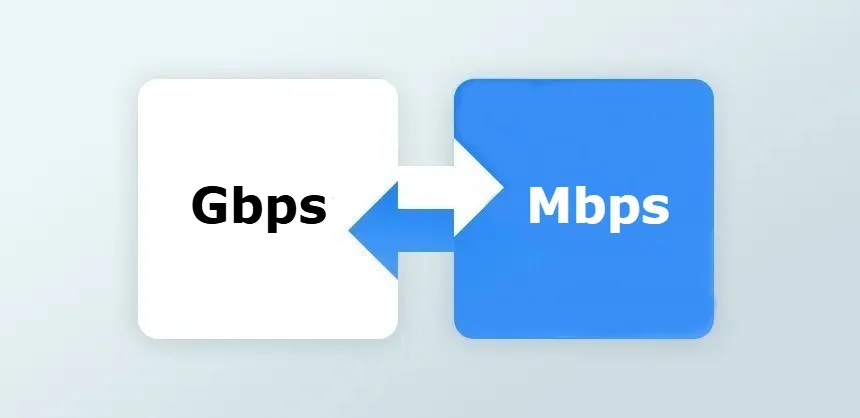Gbps to Mbps Converter - Convert Gigabits per Second to Megabits per Second
Convert between Gigabits per second (Gbps) and Megabits per second (Mbps). Analyze concurrent usage capacity, scalability, and enterprise network performance.
Enter your Gbps value
Conversion Results
Enter Gbps value to analyze enterprise network scalability
Related & Other Popular Converters
Need to swiftly convert Gbps to Mbps? The Gbps to Mbps Converter does it all for you for free, quickly and accurately. If you are testing your internet connection, comparing different network speeds, or setting up servers, the free Gbps to Mbps converter provides you with rapid calculation from either the Decimal (1 Gbps = 1000 Mbps) or Binary (1 Gbps = 1024 Mbps) standards.

What is Mbps to Gbps Conversion?
Gbps (Gigabits per second) and Mbps (Megabits per second) are two frequently used units of measurement when talking about internet and network speeds.
If you ever wondered how many Gbps in Mbps, it basically boils down to:
1 Gbps equals 1000 Mbps (Decimal) or 1024 Mbps (Binary).
This conversion allows you to truly understand bandwidth capabilities - whether you are looking to compare gigabit fiber to business fiber or what you will get out of Wi-Fi 6E.
How to Convert Gbps to Mbps
The formula for converting Gigabits per second to Megabits per second is simple:
Mbps = Gbps x 1000
For example:
If you prefer binary conversion (for computing environments):
Mbps = Gbps x 1024
You can use the Gbps to Mbps Calculator tool above to quickly generate accurate results using either system.
Common Gbps to Mbps Conversion Examples
| Gbps Speed | Equivalent Mbps | Typical Usage |
|---|---|---|
| 1 Gbps | 1000 Mbps | Home Gigabit Internet |
| 1.2 Gbps | 1200 Mbps | Fiber or Multi-Gig Plans |
| 2.5 Gbps | 2500 Mbps | High-Speed Enterprise Networks |
| 5 Gbps | 5000 Mbps | Data Centers / Cloud Networks |
| 10 Gbps | 10000 Mbps | Enterprise Ethernet Links |
These conversions are useful when setting up new routers, firewalls, or even cloud systems that support a certain bandwidth in Mbps. In these cases, it can be much easier to compare configurations and performance when you think in Mbps rather than Gbps.
Why use our Gbps to Mbps Converter?
By using the Gbps to Mbps Converter, you gain a greater sense of how fast your internet or network really is - with just one click.
Example Calculations
From here, it will also allow you to estimate download and upload speeds, while also testing your network throughput or ISP performance.
Ultimately, whether you're upgrading your home internet service, managing a data center, or provisioning high-speed cloud connections, you need to know the Gbps to Mbps conversions.
Use the SantPro Tools Gbps to Mbps Converter's instant, accurate, and reliable results every time - including the standard conversions of Gbps to Mbps like 1.2 Gbps to Mbps, 2.5 Gbps to Mbps, or 5 Gbps to Mbps.
FAQs
There are 1000 Mbps in 1 Gbps when using the decimal standard (network-based conversion).
1.2 Gbps is equivalent to 1200 Mbps (Decimal) or 1228.8 Mbps (Binary).
2.5 Gbps equals 2500 Mbps (Decimal) or 2560 Mbps (Binary).
5 Gbps = 5000 Mbps (Decimal) or 5120 Mbps (Binary).
So, we can compare internet plans, evaluate bandwidth requirements, and evaluate network configurations using units we are likely more familiar with, Mbps.
Yes, both the decimal (x1000) and binary (x1024) system is used in the converter, giving you the number you need accurately to your situation.